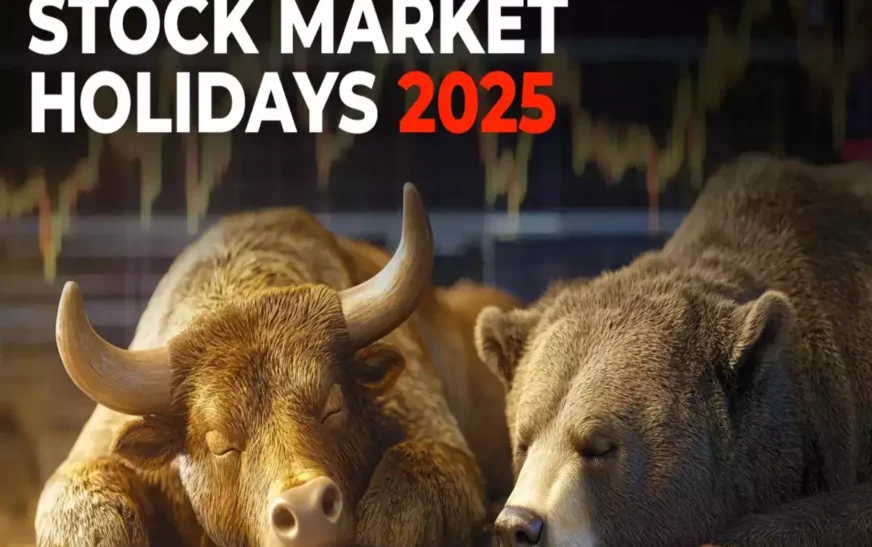Investing in the stock market can be an exciting and rewarding experience. However, it’s essential for investors to be informed about when the stock markets are open for trading. Knowing the stock market holidays allows investors to plan their trading strategies effectively and efficiently. This article presents a comprehensive guide to stock market holidays with INRbased calculations to assist investors in navigating the trading calendar.
Understanding Stock Market Holidays
Stock market holidays are days when trading activity is halted in observance of national or religious events. These holidays are significant because they impact trading volumes, market volatility, and overall investment strategies. For those trading on the Indian exchanges, awareness of these holidays is particularly crucial. It enables investors to plan their buying or selling strategy and manage their portfolios better.
Primary Stock Exchanges in India
In India, the primary stock exchanges are the Bombay Stock Exchange (BSE) and the National Stock Exchange (NSE). Both exchanges adhere to a similar holiday schedule, though minor variations may exist in their respective trading holidays. Let’s delve into the expected holidays and the potential impact on trading and settlement processes.
Complete Calendar of Stock Market Holidays
Public Holidays Observed by NSE and BSE
One of the popular aspects of the Indian stock market is how it aligns its holidays with major Indian festivities and national celebrations. Here’s a list of popular stock market holidays typically observed by the BSE and NSE:
- Republic Day January 26
- Maha Shivaratri Usually February or March (varies each year)
- Holi March (date varies)
- Ram Navami Occurs usually in March or April
- Good Friday Falls in March or April
- Dr. Babasaheb Ambedkar Jayanti April 14
- Maharashtra Day / Labour Day May 1
- EidUlFitr Date varies according to lunar calendar
- Independence Day August 15
- Ganesh Chaturthi August or September (varies)
- Gandhi Jayanti October 2
- Dussehra October (date varies)
- Diwali October or November (date varies, often accompanied by a Muhurat Trading session in the evening)
- Christmas December 25
Intricate Details of Settlement During Holidays
Understanding trading holidays isn’t just about marking your calendar. It’s about deciphering the settlement and understanding when trading can occur. Here’s a breakdown of settlement practices concerning stock market holidays:
T+1 and T+2 Settlement Cycles: Most transactions in the Indian stock market adhere to the T+1 or T+2 settlement cycle. This means that if you conduct a transaction today (T), the settlement will typically occur after one or two working days (T+1 and T+2, respectively). If a holiday falls within this period, the settlement extends accordingly.
For example, if a stock is purchased on a Monday, and Wednesday is a stock market holiday, using a T+2 cycle, the settlement is pushed to Thursday instead of Wednesday. Investors need to consider these adjustments when planning trades around holidays.
Financial Planning: Calculating the Impact of Stock Market Holidays
Let’s assume an investor is looking to purchase shares worth INR 1,00,000, intending to make use of a shortterm trading strategy. Here’s how holidays can impact calculations:
- Purchase Date: January 20 (Friday)
- Settlement Cycle: T+2
- Republic Day (January 26): Market holiday
In such a scenario, the transaction timeline alters as follows:
Trade Date (T): January 20 (Friday)
T+1: January 23 (Monday)
T+2: January 24 (Tuesday)
With Republic Day: Settlement moves to January 27 (Friday)
Thus, the delay affects the investor’s ability to execute subsequent trading strategies, potentially impacting liquidity and market exposure.
How Holidays Influence Market Volatility
Another consideration is the trend of increased volatility around stock market holidays. This phenomenon, often witnessed on the trading days leading up to holidays, stems from investors adjusting their positions or rebalancing portfolios ahead of the market shutdown. In this context:
- Trading Patterns: Investors might experience aggressive buying or selling, resulting in potential price fluctuations.
- Volume Changes: With many participants either rushing to trade or pausing for the holidays, trading volumes might fluctuate, impacting liquidity.
Factors Beyond the Calendar: Global Markets and Time Zones
Investors should note that even when Indian markets are closed, global markets might continue operations. Trending global events can influence domestic markets when they reopen. For instance, significant moves in US markets overnight might lead to gaps in opening prices in Indian markets, adding another layer for investors to consider.
Conclusion
Understanding the stock market holidays is an essential part of an investor’s toolkit. Investors trading in the Indian stock market need to map out these holidays to align with their strategic planning, considering the effects on settlement cycles and market liquidity.
Disclaimer
The content presented in this article is for informational purposes only. Investors are encouraged to conduct their research and due diligence and consider consulting a financial advisor before making investment decisions. Understanding the comprehensive landscape, including holidays, is vital in weighing the pros and cons of trading in the Indian stock market.










